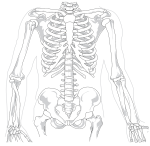
Back Pain
New coating for polymer implants should prove success rate of bones bonding in spinal surgery, new research finds
 Polymer implants, often used in spinal surgeries, have been found not to bond well with bone and other tissues, which can result in medical complications and the need for additional surgery.
Polymer implants, often used in spinal surgeries, have been found not to bond well with bone and other tissues, which can result in medical complications and the need for additional surgery.
However, researchers from North Carolina State University, have discovered a way to successfully coat polymer implants with a bioactive film which should improve the success rate of the implants, says a study first published in Journal of Biomedical Materials Research: Part A. Continue reading
New study reveals link between depression and back pain
 A new University of Sydney study, published in Arthritis Care and Research, has revealed that people with depression are 60% more likely to develop low back pain during their lifetime.
A new University of Sydney study, published in Arthritis Care and Research, has revealed that people with depression are 60% more likely to develop low back pain during their lifetime.
It is known that patients can often suffer from the two conditions, but this is said to be the first study to review all relevant research in the field and show that depression may actually trigger back pain. Continue reading
New personalised test to identify cause of back pain
 Researchers in the US have developed a new testing method for diagnosing low back pain.
Researchers in the US have developed a new testing method for diagnosing low back pain.
The study, published in Arthritis Research and Therapy, was conducted by a team at the Feinstein Institute for Medical Research in New York. Findings indicate that checking the levels of a certain protein in the blood could aid the diagnostic process. Continue reading
Exercise associated with prevention of low back pain finds large international study
 Exercise, either alone or in combination with education, may reduce the risk of low back pain, according to a review of the medical literature published in JAMA Internal Medicine. Continue reading
Exercise, either alone or in combination with education, may reduce the risk of low back pain, according to a review of the medical literature published in JAMA Internal Medicine. Continue reading
New technique may offer superior pain relief over traditional spinal cord stimulation
 A medical device company has announced the results of a study that show its device is better than traditional spinal cord stimulation in terms of relieving chronic pain.
A medical device company has announced the results of a study that show its device is better than traditional spinal cord stimulation in terms of relieving chronic pain.
Known as Burst stimulation, the new device gives intermittent “burst” pulses designed to mimic the body’s natural nerve firing patterns so theoretically provides a more physiologically-based method for chronic pain conditions. Continue reading
